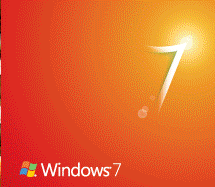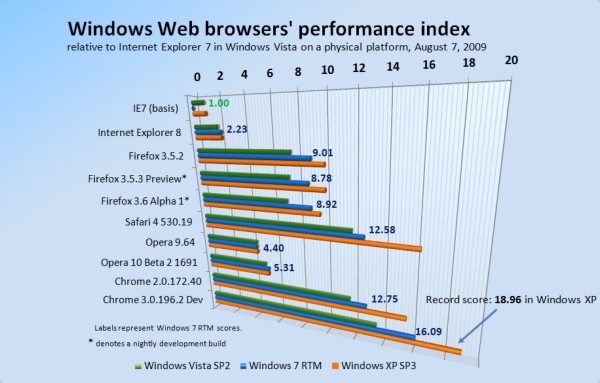
Preview of Windows 7 netbooks, PCs from Asus, Samsung, and ViewSonic
In a flashback to the more prosperous years before the current "deep recession," hordes of truly enthused journalists crowded dozens of vendors' booths at a revitalized Pepcom pre-holiday event in New York City last week, waiting for their turns to get up close and personal with forthcoming consumer electronics wares.
ViewSonic, a company known until now mostly for its monitors, introduced a total of four new PCs at Pepcom's press event Thursday night.

Why I chose Windows 7 over Snow Leopard (and you should, too)
Last week, I returned to using Windows 7 after spending the summer on a 13-inch MacBook Pro. Apple almost had me there for awhile, but I'm back where I belong and satisfied with the switch. Given that Apple released Snow Leopard a couple of weeks ago, Windows 7 officially launches October 22nd and there is plenty of geek debate about which OS is better, it's appropriate time to tell the story about how I went -- in the words of J.R.R. Tolkien -- "there and back again."
First, some background. I am a longtime Mac and Windows user. I have used Windows pretty much since its release in the early 1990s and Macs since December 1998, when I carted a Bondi Blue iMac out of a CompUSA. Based on my reading comments, many Betanews readers are religious about their platform choices; I am not. Mac OS and Windows are just tools to me. I don't dogmatically defend either platform. I'm neither Mac or Windows fanboy. My work requires using both operating systems, and for convenience one usually is primary. That said, I've flopped between platforms for more than a decade.

What is a Windows 7 upgrade, really?
In a blog post earlier this month that didn't raise any eyebrows at the time it was released, Microsoft Windows Deployment team leader Chris Hernandez posted the results of an internal company study gauging the amount of time required by different profiles of Windows Vista-based computers for an upgrade to Windows 7. According to Hernandez' numbers -- which did not surprise me in the least; in fact, at the time, I didn't think they were significant enough to highlight here in Betanews -- Hernandez' team estimated it could take as much as 20 and one-half hours to complete a Windows 7 upgrade, for an Intel Core 2 Quad Q6600-based system with 4 GB of DRAM, and a 1 TB Western Digital hard drive full of 650 GB of data, including 40 pre-installed applications. (For the record, that hardware profile is very much like the system I use for testing Web browsers.)
Hernandez' objective was to demonstrate that it takes less time to upgrade to Windows 7 than it did to upgrade from XP to Vista, usually on the order of 5%.

Lenovo launches Windows 7 ThinkPads with multitouch and outdoor screens
With the October 22 rollout of Microsoft's new operating system now little over a month away, Lenovo today introduced portable PCs with two unique screen options: a multitouch screen, enhanced by a new application called SimpleTap, plus a super bright screen visible even under the sunniest skies.
Lenovo is offering the new multiscreen technology with both its T400s laptop and X200 tablet PC. The super bright screens, however, will be available only with the X200 tablets, said Mika Majapura, worldwide segment manager for ThinkPad X-series, in a briefing for Betanews.

Microsoft: SMB 2.0 hole does affect Vista, not Windows 7
A security advisory issued by Microsoft late yesterday takes to task a security consultant for a British ISP who apparently, and possibly even accidentally, discovered a way that the Server Message Block 2.0 driver can trigger an instant Windows crash. Rather than report the incident directly to Microsoft, Laurent Gaffié went public with his findings first, in such a way that appears to have triggered the enthusiasm of the black-hat side of the security community.
"Microsoft is concerned that this new report of a vulnerability was not responsibly disclosed, potentially putting computer users at risk," reads yesterday's Security Advisory 975497. "We continue to encourage responsible disclosure of vulnerabilities. We believe the commonly accepted practice of reporting vulnerabilities directly to a vendor serves everyone's best interests."

Windows 7: Don't upgrade, says FSF, your civil rights are in jeopardy
If you're collecting reasons people have given for avoiding Windows 7 purchases and upgrades, add this one in a little shelf all to itself: It is a threat to your civil liberties, according to the Free Software Foundation.
Today is the official launch day of an FSF fundraising campaign whose stated goal is to bombard employees of 499 of the world's Fortune 500 companies (the one they left out probably wouldn't make any difference) with letters claiming, among other assertions, that Microsoft is engaging in a clandestine spy operation, masquerading under euphemistic names such as "Windows Genuine Advantage" (one example the FSF lists), invading homes, offices, and even schools.

Windows 7: Obviously I've struck a nerve
I guess I stirred up quite the beehive of activity with my last column, Windows 7 is coming: Don't upgrade. Before I continue, I wanted to share a few final thoughts on what's clearly been the most controversial piece of writing I've published in a while.
First, I'm a big boy, and I've got a thick skin. If you didn't agree with what I had to say (and many of you didn't) I promise you I didn't skulk back to my office with a sniffle in my nose and a tear in my eye after reading the comments. Pro or con, agree or disagree, if I get readers to think critically about a given issue, I've accomplished my goal. I don't particularly enjoy fanboys agreeing with my every word, so don't expect my writing to reflect some kind of middle-of-the-road festival of milquetoast mutual admiration.

Windows 7 upgrades, Family Pack will come to Europe after all
On September 1, Microsoft announced this morning, it will be making upgrade editions of Windows 7 available to European customers, as originally planned, apparently with Internet Explorer 8 included. These editions will be publicly available on the originally planned global availability date of October 22, although pre-orders will begin September 1.
This leaves a one-week window in which European customers may continue to pre-order full versions of Windows 7 Home Premium at the upgrade price, which is currently €119.99 for most European customers, £79.99 in the UK.
While we do know that €119.99 will be the upgrade price for Home Premium from September 1, and that the full version price will be somewhat higher, we do not know as of yet the specific breakdown for the upgrade prices for the Professional and Ultimate SKUs. These prices did not yet appear on Microsoft's online retail sites in foreign countries, as of 12:15 pm EDT Monday afternoon.

Windows 7 is coming: You should upgrade
I'll begin by saying that Carmi Levy is my very good friend, and I do admit that most of the time, he and I think along the very same wavelength. I met him through our mutual friend Wolfgang Gruener at TG Daily, and we've carried on a very fruitful dialogue about the IT industry ever since. That, and he has this way of making Winnie-the-Pooh berets look really cool.
We do disagree on one point today, and I think the nature of that disagreement would be beneficial to folks who are wrestling with the question Carmi brought up this morning: "To upgrade or not to upgrade." His article is worth reading, so rather than summarize it here, I'll let Carmi speak for himself.

Windows 7 is coming: Don't upgrade
To upgrade or not to upgrade: It's the issue of the moment for Windows users everywhere as the hype machine for the October 22 Windows 7 release gathers steam. And as we gaze at our existing machines, either running a snappy but outdated XP or a pokey but still slick looking Vista, and wonder whether we should be planning a late night trip to the big box store for our very own copy, I've got one word for you: Stop.
There are plenty of reasons why you'd want to refresh your existing machine with a cool new operating system. Pre-release versions of Windows 7 have displayed impressive performance, stability, and usability. Device compatibility -- a major bugaboo early on for the ill-starred Vista -- is much improved. It's smaller and lighter than the OS it ostensibly replaces, a nice reversal from the years-long tidal wave of ever-more-bloated products from the world's largest software vendor. Win7 scales better and can take advantage of more memory and multicore processors. That the new OS looks cool enough to not embarrass Windows fans when they run into Mac zealots at parties is an added bonus.

Lower profile XP Mode (N) for Windows 7 omits Media Player 9
Download Windows XP Mode (N) Release Candidate for Windows 7 from Fileforum now.
In a move which could very rapidly multiply the number of total users of Windows XP N way beyond the paltry number of users, mostly in Europe, who invested in the product in 2005, Microsoft this morning quietly released a separate version of the release candidate for its XP Mode virtualization system for Windows 7. This version creates a virtual envelope for Windows XP N, the version Microsoft created without Media Player 9 pre-installed, to appease the European Commission.

Windows XP SP3 runs browsers 13% faster than Windows 7 RTM
In a set of comprehensive Windows Web browser performance tests conducted by Betanews on August 7 -- our first test of browsers running on the final Windows 7 RTM Build 7600 distributed by Microsoft yesterday -- the five major families of browsers tended to run 13% faster on Windows XP Service Pack 3 than on Windows 7, and 29% faster than on Windows Vista Service Pack 2.
That reflects a decline in the speed gap between XP and Win7 of about 1%, from tests conducted comparing XP-based browsers to those running on Windows 7 Release Candidate Build 7100. Some browsers are faster in Windows 7 RTM, although Mozilla Firefox 3.5.2 ran just a tick slower.

Windows 7 Upgrades: Are they going to be too much trouble or just about right?
Is Microsoft asking too much of consumers and small businesses planning to upgrade existing Windows XP or Vista PCs to Windows 7? That's the question I asked several analysts after reviewing a chart Microsoft provided to veteran technology reviewer Walt Mossberg.
Out of 66 upgrade scenarios, only 14 allow for "in-place" upgrades. The majority of scenarios require "custom install," which means either installing Windows 7 to a new directory or onto a clean hard drive. While data can be backed up and recovered, applications would need to be reinstalled.

Windows 7 RTM still available via MSDN/TechNet despite heavy traffic
Right on schedule Thursday morning, what can probably be described as the "latest final edition" of Build 7600 of Windows 7 was made available to subscribers to Microsoft's MSDN and TechNet services for developers and admins. This will enable them to begin the process of finalizing upgrades to applications and to the systems using them, prior to the general availability date for the operating system, which remains set for October 22.
Absent from this morning's distribution, though not surprisingly, was any hint of "Windows 7 E," the browserless build of the OS that had been slated for distribution exclusively in Europe in the event that the European Commission had not reached a decision on the company's browser selection proposal. Last month, Microsoft presented a formal proposal to the EC that modeled a Web-based selection system for installing default browsers, one which presented Mozilla Firefox, Apple Safari, Google Chrome, and Opera alongside Internet Explorer 8, in a menu that all European Windows users would see -- not just those with Windows 7.
Testers claim discovery of serious CHKDSK bug in Windows 7 RTM build
A contributor to the online forum TheHotfix.net has provided visual evidence of what appears to be a serious memory leak caused by the CHKDSK hard disk integrity checking utility included with a build of Windows 7 that has been tagged for RTM. The bug appears to occur during phase 4 of the disk check, and can push resource usage to the 96% level.
Tester Jordan M. Jacob provides a picture of the memory leak in progress, as depicted in Windows Task Manager, a portion of which is excerpted here. (It doesn't bode well for the integrity of the test that Apple's iTunes drivers also appear to be running.) Jacob goes on to warn that the leak is capable of sending the OS into the dreaded blue screen of death (BSOD).
